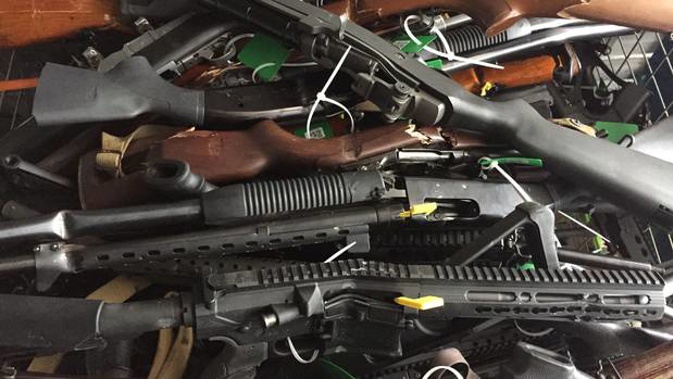
The Government will make it illegal for "high-risk people" including gang members and serious criminals to own firearms.
A new bill to be introduced will involve Firearms Prohibition Orders (FPOs) to combat the "influence of gangs and organised crime to help keep New Zealanders and their families safe", Police Minister Poto Williams said today.
It follows rising concern about gang violence and illegal firearms, prompted by a spate of incidents including a recent shooting incident outside Auckland's Sofitel Hotel, believed to involve the Mongols and Head Hunters gangs.
It also appears similar to a bill proposed by National MP Simeon Brown, which focused more on organised crime.
Williams said they expected about 1000 FPOs to be issued each year.
The moves come a few months after Police launched Operation Tauwhiro, an effort to target firearms and organised crime.
"It is no secret that gun crime is an increasing concern to our communities and we need to take further action to make sure New Zealanders and their families are kept safe," Williams said.
"It is a privilege, not a right, to own or use a gun in this country and we need to take that ability out of the hands of people who pose a threat to our communities."
FPOs will prohibit high-risk people from accessing, being around, or using firearms, she said.
A person would need to specifically commit a crime, go through a court process, and qualify under the FPO conditions, Williams said.
Qualifying offences include serious firearms offences, serious violent offences, an offence of participation in an organised criminal group, and terrorism-related offences under the Terrorism Suppression Act 2002.
A person subject to a FPO would not be able to own, use, access or be around firearms (unless securely stored).
This bill would go much wider than National's, which mostly targeted organised crime, Williams said.
"A much broader bill but targeting the most serious crime."
What National's bill did was only apply to gang members, she said.
A parliamentary select committee is considering National Party MP Simeon Brown's member's bill, which is aimed at preventing prevent gang members from holding a firearms licence and to allow police to use Firearm Prohibition Orders to search and seize firearms from gang members who have a history of serious crimes.
That passed its first reading prior to last year's election with support from NZ First, but was not supported by Labour.
Brown said the policy appeared a "change of heart for the Government" after it twice voted against National's legislation.
"It's failure to act quickly has meant gangs have become more entrenched, and more emboldened," he said.
"If the Government was truly serious about cracking down on illegal ownership of guns, it would've made changes to National's FPO legislation that's currently in select committee, speeding up the process, rather than throwing it out just to introduce its own legislation.
"Had Labour worked with the National Party when we first called for FPOs, we could've had them in place by now."
National had questions around search powers and applying FPOs after crimes were committed, not before, he said.
The policy still had to go through select committee, Williams said
"This complements work this government has already taken, including a record investment in police, meaning we have been able to go hard against gangs and organised crime networks.
"We have the largest police workforce ever, with 700 officers to be focused on organised crime."
The police consultation document mentioned disproportionate impacts on Māori. Asked about this, Williams said the bill would focus on addressing the most serious offending.
Alongside this, the Criminal Proceeds (Recovery) Act will be amended to introduce a new power enabling seizure of assets of those associated with organised crime – where the person's known legitimate income is likely to have been insufficient to acquire the asset.
"We're hitting gangs where it hurts – their pockets," Justice Minister Kris Faafoi said.
"This new organised crime power will help prevent those involved in organised crime from benefiting from crime and remove the primary reason for organised crime to exist – the profits they can make from vulnerable New Zealanders.
"Those involved in organised crime, including those who launder their money, would have to demonstrate their assets were obtained legitimately.
"These reforms signal that those who choose to be associated with groups actively undertaking criminal activities in our communities are liable to have their property subject to investigation by the Commissioner of Police and risk wider asset forfeiture."
Faafoi said there was evidence of gang leaderships structuring themselves to benefit but remove themselves from the crime, and these measures would help address that.
Not just cars and expensive items, but clothes, shoes and other accessories being used to attract young people to gangs, he said.
The onus will be on those who have purchased this property, to prove it has come from legitimate income.
Asked how this would not lead to racial profiling, Faafoi said it would require "sensitive policing".
Making a distinction between someone in a gang and someone who was not was something police would be working through, but Faafoi said he "absolutely" had faith in police to do this work fairly.
Williams said it was her "absolute desire" to ensure there are no more disproportionate rates of arrests and charging of Māori.
There was no denying Māori and Pasifika were disproportionately impacted in the justice system, and so more work needed to be done to address it.
It was not just justice, but across the whole of Government, she said.
More than $1 billion has been recovered since the legislation came into being, and this amendment to the Criminal Proceeds (Recovery) Act will enhance this capacity, Faafoi said.
Labour's investment in police had also investigations such as Operation Tauwhiro, a national operation launched by police in February targeting the disruption and prevention of firearms-related violence by criminal gangs and organised criminal groups.
Since Operation Tauwhiro launched in February, 350 firearms have been seized, along with $2.46 million in cash. 378 people have been arrested in relation to firearms offences, Williams said.
Both the Firearms Prohibition Order Bill, and the Criminal Proceeds (Recovery) Amendment Bill will be introduced into the House before the end of the year, and the public will have an opportunity to comment on the bills when they are referred to select committee.
The Government banned military-style semi-automatics and assault rifles in 2019 after the Christchurch terror attacks.
By June the following year, a second set of gun law reforms was passed in Parliament.
In March, Prime Minister Jacinda Ardern said the rise of gang violence was concerning the Government, and put it down to the so-called "501s" – deportees from Australia – setting up gangs in New Zealand.
In a briefing to Police Minister Poto Williams, Assistant Commissioner Richard Chambers had noted an increase in gang-related violence in the Counties Manukau police district, with violent clashes linked to tensions between members of the Tribesmen MC and Killer Beez gangs.
It said worsening gun violence linked to gang turf wars, illicit drugs and organised crime had left more than 350 people with firearms injuries across Auckland in five years.
Under the proposed bill, a FPO would last up to 10 years and penalties envisaged would depend on which conditions the person had breached.
A person who was found in possession or control of a firearm would face a penalty of up to five years' imprisonment, or up to seven years' imprisonment if the firearm was a prohibited firearm.
If the person breached a condition such as residing in a location where there were firearms, or visiting a prohibited location such as gun shop, the penalty would be up to two years' imprisonment.
Take your Radio, Podcasts and Music with you









